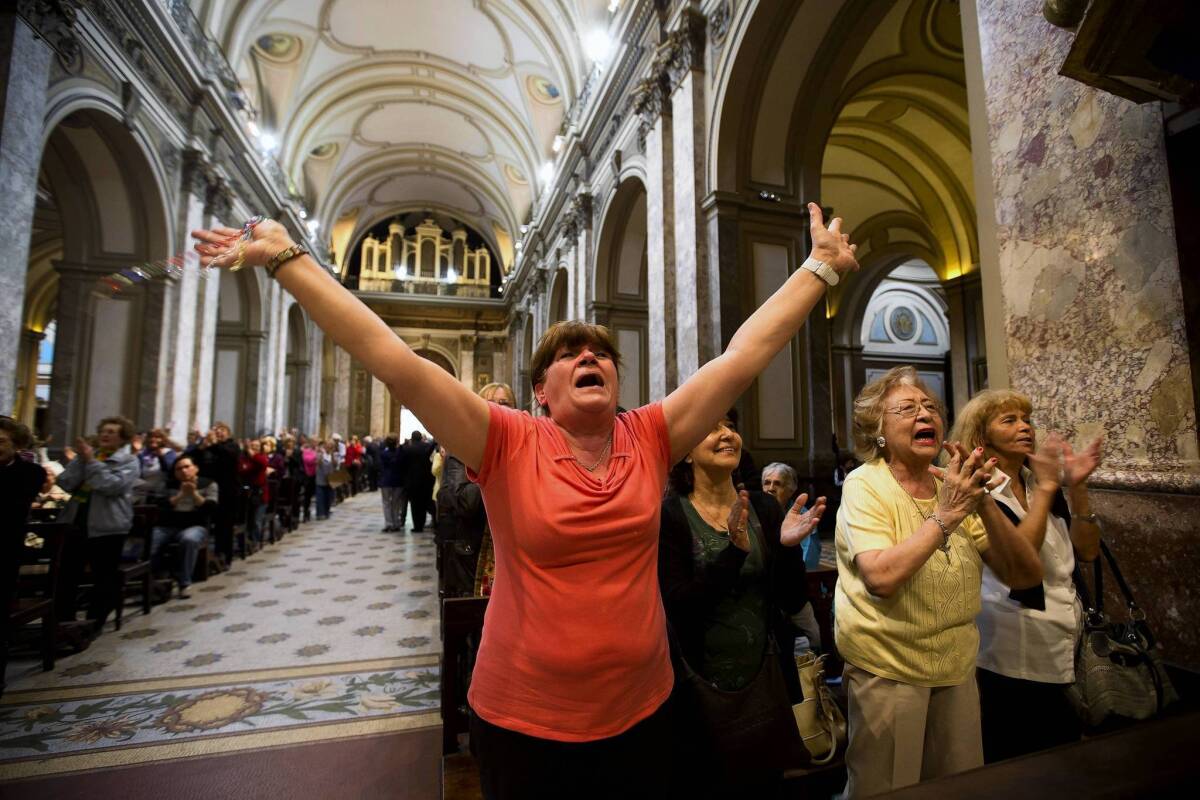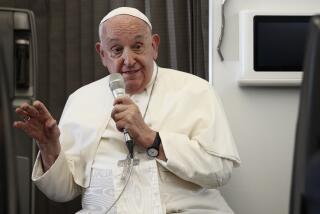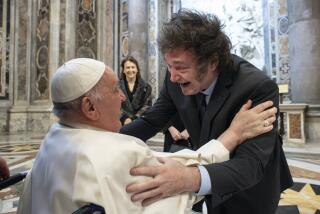Pope Francis: Humility and simple life lead Jesuit to papacy

VATICAN CITY â From his willingness to cook his own meals and get around by bus, to his choice of St. Francis as inspiration for his name, the new pope has stressed humility and a simple life that could signal a change in tone at the center of the Roman Catholic Church.
Jorge Mario Bergoglio of Buenos Aires, 76, is the first person from the Americas and the first Jesuit to be elected pope. The son of a railway worker, he rose to become regional superior of the Jesuit order in Argentina and then an archbishop, spending most of his career teaching priests and advocating for the poor through times of economic crisis in his home nation.
âHis own matter of life shows he takes his vow of poverty very seriously,â said the Rev. Drew Christiansen, visiting scholar in the theology department of Boston College. Even as a cardinal, the role he has had since 2001, Bergoglio eschewed many of the customary trappings and luxuries afforded to senior prelates, especially in Latin America, Christiansen recalled.
âHe has a real commitment to simplicity in life.â
PHOTOS: Vatican conclave | Life of new Pope Francis
Like his predecessor, Bergoglio is equally committed to conservative, traditional doctrine, people who know him say, a sensibility fostered in part by his theological studies in Germany. He was a staunch opponent of abortion and same-sex marriage, issues that an increasingly secular Argentina has embraced. He once said allowing gay couples to adopt constituted discrimination of the children.
And his record during Argentinaâs dark days of military rule and the so-called dirty war, when dissidents were kidnapped and murdered, has been questioned.
Fellow Jesuits, whose order is known for an emphasis on education and intellectual rigor, said they were shocked that one of their own had been elevated to the papacy.
âThe Jesuits are used to serving and often resist becoming bishops, so to see one become pope I see as a call to service, a strong summons and not an ambition,â said Vatican spokesman the Rev. Federico Lombardi, a Jesuit. âWe have a pope who wants to serve.... All the talk this week of power and the search for power? This is a radical response. It is a refusal of power.â
Despite his advanced age and the fact that he lost one lung as a young man, Bergoglio, the son of Italian immigrants, seemed to fit many of the bills that cardinals had expressed support for. He is not a Vatican insider and has a gentle, humorous manner with learned, if reserved, communications skills. He is also fondly remembered by many Catholics for a tough speech he gave last year criticizing church officials for hypocrisy because of their high living and neglect of the infirm and outcast.
âHe always had a reputation for being a very holy man, intense and deeply committed to prayer,â said the Rev. Matt Malone, editor of the Jesuit magazine America. âBut he is not going to make moves to somehow change church teachings on the core issues.â
Malone and others described Bergoglio also as a pastoral prelate, meaning he knows how to tell a good sermon and convey the churchâs message, the tasks encompassed by what is often called the new evangelization, considered by many a top priority for the church.
âHe will be able to communicate the truth of the church in areas where we have been struggling,â Malone said. Latin America, for example, while home to the largest population of Catholics, has lost many faithful to Protestant denominations and to modern Western secularization.
And although it is not the first skill mentioned in association with the new Pope Francis, several people who know him said he can be a good manager and served as a strong bishop in his archdiocese. The Vatican bureaucracy that the pope is inheriting has been widely criticized for mismanagement and corruption.
Associates said it was significant that the new pope chose the name Francis because St. Francis of Assisi was known for rebuilding the church across the land, saving it from moral decay and refocusing it on the poor as opposed to the ruling class, an important shift in the history of Roman Catholicism.
But his outreach to the poor only goes so far â he opposed the left-leaning liberation theology that swept Latin America in the 1960s and â70s and propelled many priests into slums and faith-based communities.
And Bergoglio has been accused of passivity toward, and perhaps complicity in, the human rights atrocities committed by Argentinaâs military dictatorship in the late 1970s and early â80s, allegations he has branded as slanderous. One Jesuit priest said in court that Bergoglio in effect handed him over to the junta, which tortured him. Years later, Bergoglio lent important support to a civilian governmentâs attempts to prosecute military abusers.
Trained as a chemist before entering the priesthood, Bergoglio became the rector of the Jesuit seminary from which he graduated. He was named archbishop of Buenos Aires in 1998 and became a cardinal in 2001. A purported diary from a cardinal who participated in the 2005 conclave confirmed that Bergoglio came in second on all four ballots taken to eventually elect Joseph Ratzinger as pope. At the time, Bergoglio purportedly said he did not want the job, the diary said.
The first time Javier Donetti, a musician and teacher in the small Argentine town of Recreo, met Bergoglio in 2010, he didnât even realize that Argentinaâs top religious authority was shaking his hand. âHe was so humble and unassuming, I thought he was the doorman,â said Donetti, who has attended conferences of the nationâs Catholic leadership. âLater somebody said, âHey, did you know you were just talking to the cardinal?ââ
Bergoglio himself put it this way, in last yearâs speech:
âJesus teaches us another way: Go out. Go out and share your testimony, go out and interact with your brothers, go out and share, go out and ask,â Bergoglio said. âBecome the Word in body as well as spirit.â
MORE:
The men who will not be pope (this time)
Insiders didnât predict Bergoglio, but who did?
With prayer, Francis starts his first full day as pope
Times staff writer Ken Bensinger in Los Angeles contributed to this report.
More to Read
Sign up for Essential California
The most important California stories and recommendations in your inbox every morning.
You may occasionally receive promotional content from the Los Angeles Times.











